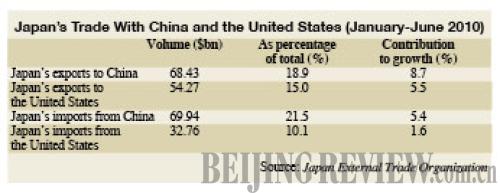|
 |
|
JOINT STAKES: Chairman and CEO of Japan's SoftBank Corp. Masayoshi Son speaks at a joint press conference held by China's largest retail website Taobao.com and Yahoo! Japan in Tokyo on June 1. The two launched an online shopping service available to users in both countries (JI CHUNPENG) | Common interests
In political and security fields, China-Japan relations have continued to improve since the DPJ took power in September last year. Both former Prime Minister Yukio Hatoyama and current Prime Minister Naoto Kan have been friendly toward China.
In December 2009, then DPJ Secretary General Ichiro Ozawa led a 600-person delegation, including more than 140 parliamentarians, to China. From late May to early June this year, Chinese Premier Wen Jiabao visited Japan. During his visit, the two countries announced a series of concrete measures to strengthen political trust and mutually beneficial cooperation.
Both Hatoyama and Kan vowed not to visit the Yasukuni Shrine. The shrine was built to honor Japanese war dead, including war criminals from World War II. Kan also forbade his cabinet members from visiting the shrine on August 15, which marked the 65th anniversary of Japan's surrender. Shrine visits by Japanese politicians in the past hurt Japan's relations with China and its other Asian neighbors—countries that suffered heavily from Japanese aggression during World War II.
In terms of international and regional cooperation, China and Japan will face similar challenges. Meanwhile, they are gaining more and more common interests.
The most prominent of these common interests is peace and stability in Northeast Asia. Although they took different approaches when dealing with the Korean Peninsula nuclear issue and the sinking of the South Korean warship Cheonan, both countries were attempting to maintain regional stability. Neither of them wants to see tension in Northeast Asia.
Regional integration is also crucial for both countries in the aftermath of the global financial crisis. That's why both are keen on establishing new frameworks for regional economic cooperation in Northeast Asia and East Asia.
They are particularly active in promoting the establishment of a China-Japan-South Korea free trade area. If a breakthrough were made in this area, all of East Asia would benefit. The further opening up of the three countries' markets would also lead to an expanded market share for the United States and the EU in the three countries.
In addition, China and Japan share common interests on a number of global issues, such as environmental degradation, climate change, terrorism, drug trafficking and piracy. For instance, at the third China-Japan high-level economic dialogue, the two countries pledged to worked together to advance international climate change negotiations. They are also committed to taking actions to cope with climate change based on their respective responsibilities and capabilities.
The author is a professor with the Institute of International Relations of the China Foreign Affairs University | 